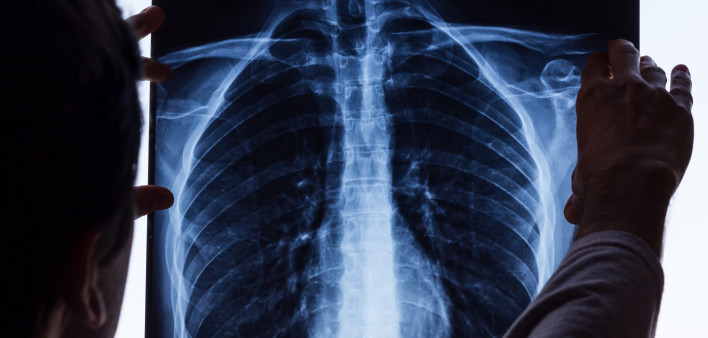The Food and Drug Administration (FDA) has approved pretomanid, a new medication that, when combined with two other drugs, has a cure rate of nearly 90% and can shorten treatment for highly drug-resistant tuberculosis (TB) by a year.
Pretomanid is only the third new TB medication approved by the FDA in more than 40 years, as well as the first to be developed by a not-for-profit organization, according to the TB Alliance, which acquired rights to the compound in 2002.
“FDA approval of this treatment represents a victory for the people suffering from these highly drug-resistant forms of the world’s deadliest infectious disease,” TB Alliance president and CEO Mel Spigelman, MD, said in a press release. “The associated novel regimen will hopefully provide a shorter, more easily manageable and highly efficacious treatment for those in need.”
Tuberculosis is among the most deadly infectious diseases, and it is the leading cause of death for people with HIV worldwide. The bacteria that cause TB have become resistant to many of the drugs used to treat it. Multidrug-resistant (MDR-TB) does not respond to isoniazid and rifampin, two of the most potent TB medications. Extensively drug-resistant tuberculosis (XDR-TB) is resistant to these two drugs plus fluoroquinolone antibiotics and one or more injectable second-line therapies, making it very difficult to treat. Standard therapy for XDR-TB, which involves multiple drugs taken for at least 18 months, only cures about a third of treated patients.
Pretomanid (formerly known as PA-824) is a nitroimidazole antibiotic that works against drug-resistant strains of TB bacteria. It is taken as a pill and is generally well tolerated, unlike some existing TB medications that must be given by injection and can potentially cause severe side effects.
Pretomanid was evaluated in the Phase III Nix-TB trial, which included 109 people in South Africa who had pulmonary (affecting the lungs) XDR-TB, MDR-TB that did not respond to other medications or were unable to tolerate existing therapies. About half were living with HIV. Participants were treated with an all-oral triple regimen of pretomanid plus Sirturo (bedaquiline) and Zyvox (linezolid) for six months.
Among the 107 patients evaluated six months after the end of treatment, 89% had negative TB cultures, meaning no evidence of ongoing infection. Two people extended their treatment from six to nine months. Treatment was highly successful for both HIV-positive and HIV-negative participants.
Treatment with the triple regimen was generally well tolerated in comparison with existing therapies for highly resistant TB. Adverse events include peripheral neuropathy (nerve damage), vision problems due to optic nerve damage, skin rash, nausea, diarrhea, low blood cell counts due to bone marrow damage and elevated liver enzymes.
“Multidrug-resistant TB and extensively drug-resistant TB are public health threats due to limited treatment options,” FDA principal deputy commissioner Amy Abernethy, MD, PhD, said in a news release. “New treatments are important to meet patient national and global health needs. That’s why, among our other efforts to address antimicrobial resistance, we’re focused on facilitating the development of safe and effective new treatments to give patients more options to fight life-threatening infections.”
Abernethy noted that pretomanid is the second drug approved under the FDA’s Limited Population Pathway for Antibacterial and Antifungal Drugs, which facilitates the development of therapies for serious or life-threatening infections that affect a relatively small number of people. While TB overall is widespread, XDR-TB is still uncommon.
The drug label for pretomanid will state that it should only be used by a limited group of TB patients, reflecting the study population. It is not indicated for people with drug-sensitive TB, those with latent TB infection or those with extrapulmonary (outside the lungs) TB.
The Treatment Action Group (TAG) welcomed a simpler and shorter regimen for difficult-to-treat TB, but raised concerns about lowering the bar for approval of new therapies with only limited safety and efficacy data from a small, uncontrolled study.
“Robust development programs based on randomized controlled trials must continue to be the required bar for new drug and regimen approval, even and especially for the world’s deadliest infectious disease, to ensure that those with TB receive treatment that meets the highest scientific standards for safety and efficacy,” TAG executive director Mark Harrington said in a statement.
The TB Alliance has partnered with the generic drug manufacturer Mylan to produce pretomanid; it is expected to be available in the United States by the end of the year. The organization has submitted data to the World Health Organization for consideration of the new drug to be included in treatment guidelines for highly resistant TB. The TB Alliance indicated that it is working to make the medication available free or at low cost in low-income countries with a high TB burden. TAG has called for a global price of $1 a day, or around $500 for a full course of treatment for drug-resistant TB.







Comments
Comments